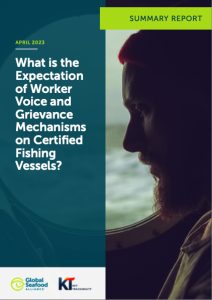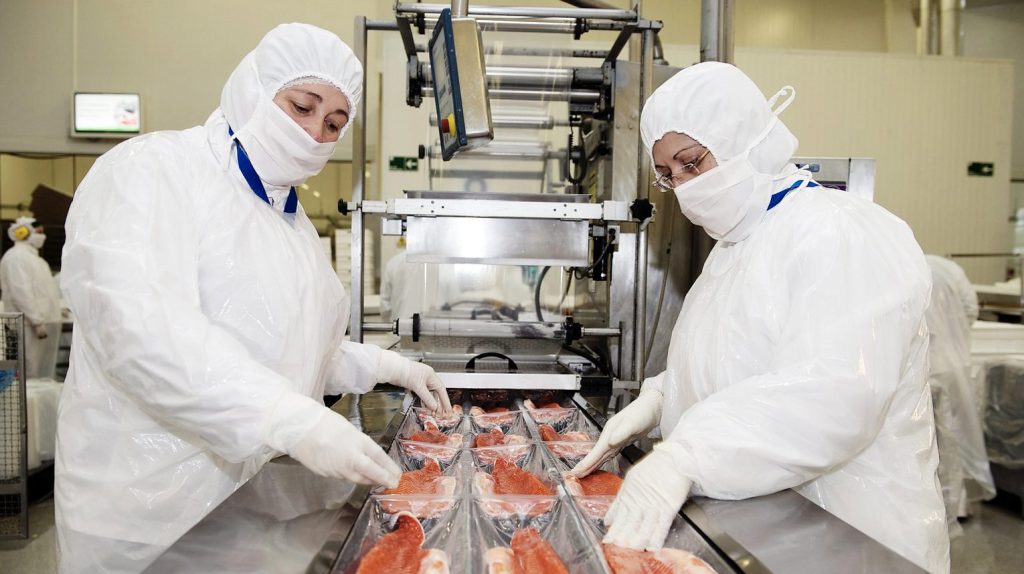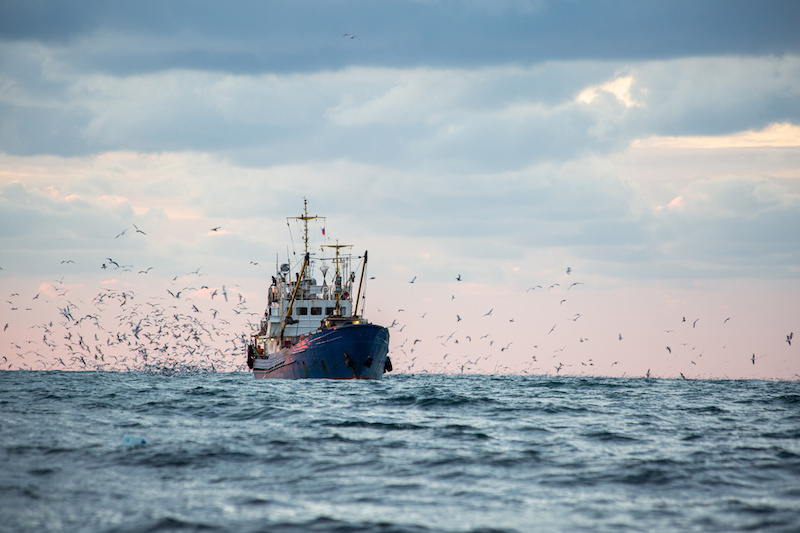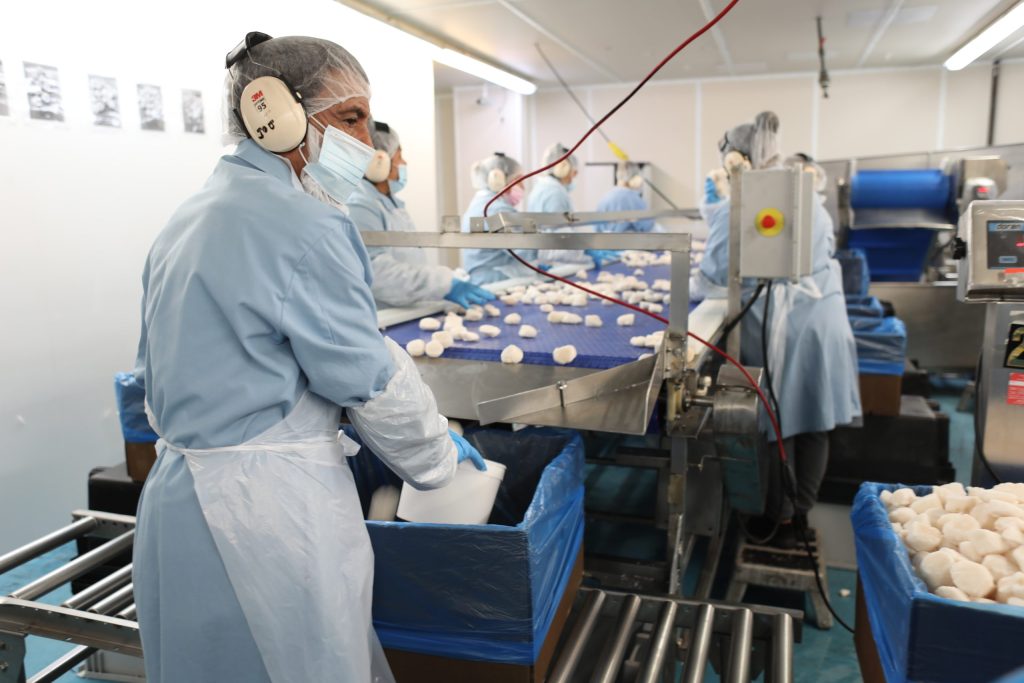GSA Releases Final Report, ‘What Is the Expectation of Worker Voice and Grievance Mechanisms on Certified Vessels?’
 The Global Seafood Alliance (GSA) has released the final report from an action research project undertaken through 2022 entitled, “What Is the Expectation of Worker Voice and Grievance Mechanisms on Certified Vessels?” Supported by the David & Lucile Packard Foundation, the project engaged with over 150 stakeholders across more than 30 countries. Key Traceability was contracted to lead the research.
The Global Seafood Alliance (GSA) has released the final report from an action research project undertaken through 2022 entitled, “What Is the Expectation of Worker Voice and Grievance Mechanisms on Certified Vessels?” Supported by the David & Lucile Packard Foundation, the project engaged with over 150 stakeholders across more than 30 countries. Key Traceability was contracted to lead the research.
Findings include that on fishing vessels working at, or towards, best practices, it is expected that crew have safe, fast access to appropriate grievance mechanisms and are properly represented through worker voice mechanisms. These findings can set the target for all fishing vessels. The summary report is available here.
“While there is strong consensus on the importance of good worker voice and a grievance mechanism process for fishing crew – and the expectation that they are in place on vessels working at best practice – there is little or no guidance as to how to build and operate quality mechanisms,” said Melanie Siggs, GSA’s Director of Strategic Engagements, who led the project.
“It also became apparent that better preparation at recruitment and access to Wi-Fi at sea are key to improving good crew welfare, which can help reduce the need to use such mechanisms.”
Access Full Report Access Summary Report
The research illustrated the importance of supporting skippers and vessel owners in creating and operating these processes, as well as the benefits of laying necessary groundwork early, beginning with the hiring process. Further research is also recommended to, for example, understand current levels of access to Wi-Fi and conditions of Wi-Fi access.
Key recommendations include:
1. Develop an international dialogue to build a code of best practice to foster effective worker voice and grievance mechanisms on fishing vessels based on global guidance, experience and frameworks.
2. Specify requirements, beyond building of the process, within the code of best practice for effective worker voice and grievance mechanisms, such as:
- Training for vessel owners and skippers on how to create grievance mechanisms, enable participation in worker voice representation, and specific requirements that support good preparation of crew at recruitment.
- Preparation of crew at recruitment to include full understanding of the role’s work and responsibilities, the contract, including pay; amount and how it will be paid; rights on board, and training to be provided.
- Language appropriate information. Information to ensure crew know how to access a grievance mechanism on board and at port.
- Communications access. All fishing trips over 24 hours should provide crew with free access to Wi-Fi on a daily basis.
- Share experience of best practice and applicable tools.
“Stella Maris are delighted to see these reports completed and the proposal for collaboration on determining best practice to provide vessel owners, regulators, skipper and others on how to provide meaningful grievance mechanism and worker voice representation for fishing vessel crew at sea,” commented Captain Esteban Pacha, Chair of Stella Maris Trustees. “It is imperative to include the voice of the crew themselves and we look forward to supporting next steps.”
The recommendations for action propose that all stakeholders have a role to play in developing guidelines of best practices. It also proposes critical research to understand access to Wi-Fi at sea and conditions of that access.
The intent of such collective, inclusive, action, which must include crew representatives, is to provide vessel owners, recruiters, standard setters, regulators and buyers with the tools needed not only to provide safe, confident, access to resolve issues, but also to reduce the incidences of need to use such processes by addressing common issues before they arise.
These actions are intended to represent best practices at the current time, allowing all parties to work toward common, agreed, goals. Defined goals would need testing over time.
About the Global Seafood Alliance
The Global Seafood Alliance is an international, nonprofit trade association dedicated to advancing responsible seafood practices through education, advocacy and third-party assurances. Through the development of its Best Aquaculture Practices and Best Seafood Practices certification programs, GSA has become the leading provider of assurances for seafood globally. The organization’s work addresses the full spectrum of responsibility, from environmental responsibility and social accountability to food safety. Established in 1997 as the Global Aquaculture Alliance, GSA is headquartered in Portsmouth, N.H., USA. To learn more, visit www.globalseafood.org.
About Key Traceability
Key Traceability was launched in 2015 and is based in Portsmouth, UK, with team members located across Europe and Asia-Pacific. The company has built-up extensive knowledge of the international standards and best practices for fisheries, aquaculture and working conditions. Key Traceability offers environmental, social and economic services across the marine sector specialising in establishing and coordinating FIPs, conducting social audits, providing information on best practices and driving improvements on the water, advising on sustainability and purchasing policies, and undertaking industry research.




